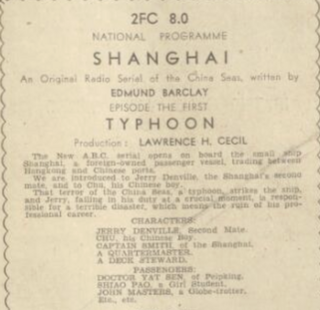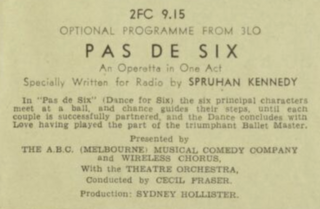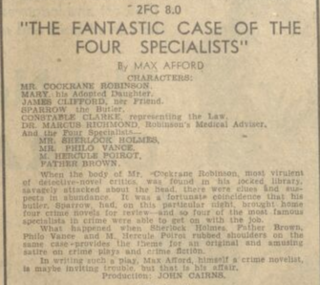Edmund Piers Barclay was an English-Australian writer known for his work in radio drama. Radio historian Richard Lane called him "Australian radio's first great writer and, many would say, Australian radio's greatest playwright ever." Frank Clelow, director of ABC Drama, called him "one of the outstanding radio dramatists of the world, with a remarkable technical skill and ability to use the fade-back without confusing the audience."
Daybreak is a 1938 Australian play by Catherine Shepherd.

An Antarctic Epic is a 1933 Australian radio drama by Edmund Barclay about the Scott Expedition to Antarctica. It was the first radio drama script by Barclay who went on to become arguably Australia's leading radio writer.

Shanghai is a 1936 radio serial by Edmund Barclay. It ran for 26 weeks.
Khyber is a 1935 Australian radio serial by Edmund Barclay set in the north west frontier of India. According to contemporary reports "Undoubtedly it has proved one of the most successful serials ever broadcast in Australia or any part of the world."

Pas de Six is a 1936 Australian operetta that aired in November 1936. It went for an hour and was recorded in Melbourne.
Merry-Go-Round is a 1936 Australian radio play by Max Afford. It won first prize in the ABC Radio Contest for best play.

The Mysterious Mr. Lynch is a 1939 Australian radio serial by Max Afford. It starred Peter Finch as its detective hero, Jeffrey Blackburn.
Henry Lawson Stories was a name given to a series of 1937 Australian radio plays on the ABC where Edmund Barclay adapted stories of Henry Lawson.
Into the Light is a 1938 Australian radio serial by Edmund Barclay. It followed on from this success with As Ye Sow.
Dead or Alive is an Australian radio serial by Edmund Barclay. The series was a follow up to Barclay's successful serial Khyber.
Singapore Spy is a 1939 Australian radio drama serial from Edmund Barclay set in Singapore. It was an adventure serial in the vein of his earlier works Khyber and Shanghai.
Valley of the Sky is a 1937 Australian novel by Tarlton Rayment that was based on the life of Angus McMillan.
The Resignation of Mr. Bagsworth is a stage play by Lionel Shave.
Avalanche is a 1934 Australian radio drama by Max Afford. It was a significant work in Afford's early career.

The Fantastic Case of the Four Specialists is a 1937 Australian radio play by Max Afford. The play was one of Afford's best known.
The Twelve Labours of Hercules is a 1938 Australian radio serial by Max Afford based on the legend of Hercules.
Silver from Satan is a 1937 Australian radio play by Max Afford.
Fly By Night is a 1937 Australian radio serial by Max Afford. It was his first radio serial featuring Afford's detective hero, Jeffrey Blackburn. In this serial he was not married to Elizabeth but they would be married for subsequent serials.
The Night Watchman is a 1940 Australian radio series by Max Afford based on the story by W. Jacobs. It was an anthology series based on different stories by Jacobs, all narrated by a night watchman. The show replaced Afford's Grey Face.





